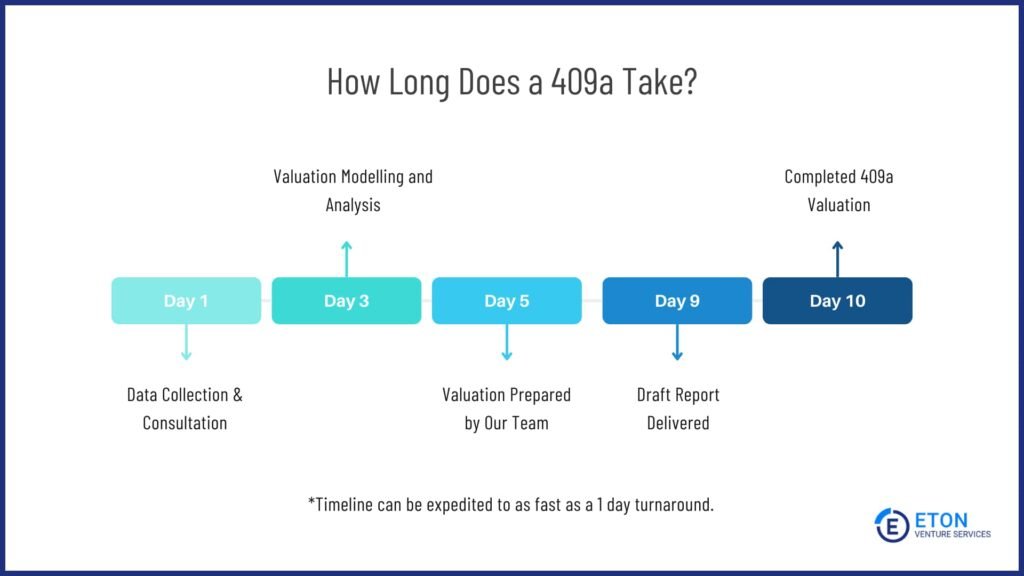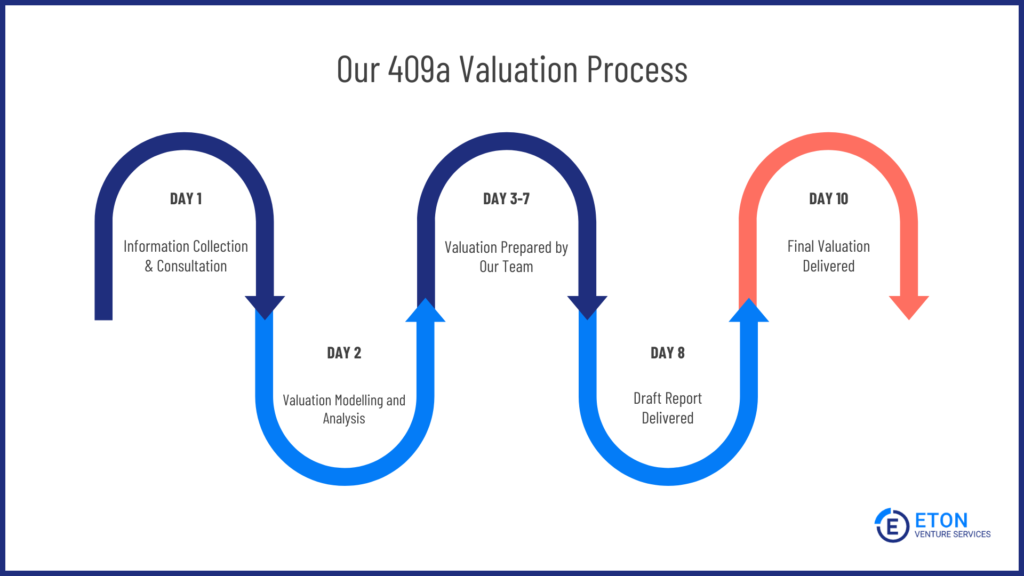Hi, I’m Chris Walton, author of this guide and CEO of Eton Venture Services.
I’ve spent much of my career working as a corporate transactional lawyer at Gunderson Dettmer, becoming an expert in tax law & venture financing. Since starting Eton, I’ve completed thousands of business valuations for companies of all sizes.

Read my full bio here.
In this article, we’ll walk you what’s required of your company when it comes to 409A valuations—so you stay compliant and avoid 409A penalties.
To qualify for the “Safe Harbor” under IRC Section 409A, every business that completes a 409A valuation must adhere to the same requirements.
These are:
“Ensure that incentive equity is offered to employees pursuant to a written 409A valuation assessment.”
What it means: The valuation must be a written report.
“409A valuations must be updated on the earlier of every 12 months, or the occurrence of a “material event”.”
What it means: Valuations expire after 12 months, if not already expired due to new information material to the company’s value.
“Must update their 409A valuation on the occurrence of material event.”
What it means: A valuation becomes invalid the moment it fails to reflect all available information that is material to the value of the company.
“Use an independent specialist to complete each 409A valuation.”
What it means: The valuation must be performed by a qualified individual.
“Valuing your business through the use of a “reasonable” valuation method.”
What it means: Your valuation provider must take into account all available information that could affect your company’s valuation. They should apply that information consistently to determine valuations regardless of the purpose.
A “safe harbor” means your valuation is considered valid and defensible by the IRS. The beauty of the “safe harbor” is that, once achieved, you shift the burden of proof to the IRS. If they ever decide to challenge your valuation, it’s on them to prove your stock exercise price was less than FMV on the date the grant was issued.
If no material event occurs, you can rely on your 409A valuation for the full 12-month period. Then it expires.
If a material event (e.g., financing, acquisition offer, major revenue change) happens, the 409A valuation expires immediately — and you must get a new one.
This means your stock option grants can only be priced off the valuation during its valid window.
It’s important to stay up to date with their 409A valuations to ensure compliance with IRS regulations and to avoid potential tax penalties for their employees.
In our legal analysis of Wilson vs. Safelite, we look at who suffers when 409A valuations are done incorrectly.
Read the full article here (it should give you an indicator of why 409A compliance matters).
Three main instances trigger the need for a 409A valuation:
A ‘material event’ is anything that changes the value of that company, such as:
409A valuations are required pretty early on in most startups because most want to incentivize their employees with stock options and make sure that they comply with tax law when doing so.
If you are granting stock options and want to comply with tax law, you must complete a 409A valuation every 12 months (or sooner if a material event occurs).
Why 12 months? Over a year, a company can undergo various changes that might affect its value – such as growth in revenue, changes in the market, or new product launches.
More frequent valuations could theoretically provide a more accurate reflection of a company’s fair market value at any given moment, but they would also be more burdensome and costly for companies.
An update every 12 months makes 409A valuations more practical while still offering a regular update to fair market valuation.
If you experience a material event before those 12 months are up, you’ll need to complete another 409A valuation. The 12-month rule will then apply to your most recent 409A valuation.
Let’s say you offer stock to your employees in March. You will need a 409A valuation done before granting the stock options in March to tell you the market value of that stock. The next valuation wouldn’t be due until March of the following year.
However, if you raise Series A that September, then you’ll need to complete a second 409A valuation before granting any stock options. A new valuation would then be due 12 months later.

An accurate 409A valuation can take anywhere from 10 days to 1 month, depending on the consultant you use.
It can be completed faster but most quality 409A valuation providers will charge additional fees to expedite the valuation.
Our standard 409A valuation timeline takes 10 days upon receipt of the company’s documents.
Read our in-depth guide to How Long a 409A Valuation Takes here.

At Eton Venture Services, our 409A valuation approach begins with data collection and a one-on-one consultation. Both help us understand your company’s position and needs.
At that point, our valuation experts conduct initial modeling and analyses aligned with industry guidance and your goals.
That’s followed by an in-depth internal review and report creation (all of which is done by us—no requirement from you).
On day seven or eight, you’ll receive a copy of the draft report and we will ask you to provide feedback.
Once we’ve incorporated any feedback (and walked you through the analysis if you prefer), a finalized 409A valuation report will be sent to you for use no later than day ten.
Having the correct company data and documentation is a critical part of creating an audit-defensible 409A valuation.
Luckily, most companies already have the data and documents organized from other events, such as venture financing.
The documents we require are:
1. Financial Statements
Financial statements (including income statements and balance sheets) offer a snapshot of your company’s financial health and performance. They are crucial for evaluators to understand your business’s current financial position and historical performance.
2. Financial Forecasts
Forecasts project future revenue, expenses, and growth. They help our valuation experts assess the potential future path and future value of your company, which is a key factor in determining the fair market value of your stock.
3. Capitalization Table
The capitalization table provides a detailed breakdown of your company’s ownership structure, including the classes of equity, the number of shares outstanding, and the number of options granted.
Many cap tables also capture details such as the original issue price and date of issuance. This information is vital to understand the distribution and value of equity, which directly impacts the valuation.
4. Articles of Incorporation
This document, also known as a “Charter”, is a legal document that officially recognizes a company as a corporation. It outlines key details like the corporation’s name, purpose, structure, and stock information, and is essential for the legal operation of the business. Because it provides fundamental information about the company, it provides a legal baseline for the valuation, ensuring that the valuation adheres to the legal framework of your organization.
5. Business Plan; Investor Presentation Deck
The deck you show to investors provides insight into your business model, market potential, growth strategy, and how you present your company to external stakeholders.
This helps our valuation experts gauge market position, market opportunity, and growth potential.
6. Convertibles (SAFE Notes, Convertible Debt, KISSs, etc.)
Convertibles like SAFE notes, convertible debt, and KISSs are financial instruments that may convert into equity in the future, impacting your company’s capital structure.
These agreements are crucial for understanding potential equity obligations and their influence on your company’s valuation.
7. Straight Debt (if applicable)
Straight debt includes standard loans and credit lines that impact your company’s liabilities. Understanding these financial obligations is crucial for an accurate valuation, as they directly affect the company’s net worth.
A 409A valuation with Eton will cost you between $2500 and $4000 (most clients pay around $3000). The cost is dependent on the stage of your business and the complexity of your capitalization table.
Interested in a full breakdown of 409A valuation costs?
Read our article: How Much Does a 409A Valuation Cost? Prices in 2024
To avoid IRS 409a valuation penalties you must:
Let’s take a look at each of these in more depth.
One of the most critical aspects of a 409A valuation is adherence to the Internal Revenue Service (IRS) rules.
Are you issuing stock options, or have outstanding stock options that could be exercised? Failing to complete a 409A valuation every 12 months or immediately after a material event can lead to significant penalties.
Using an independent specialist for your 409A valuation is a safeguard against penalties.
409A valuation firms who are experienced and well-versed in IRS guidelines ensure that your valuation is compliant and withstands scrutiny.
Most startups, particularly those without the internal resources or expertise to navigate these complex valuations, would benefit from the services of an independent, qualified specialist.
Make sure that your independent qualified appraiser produces a written report and s/he signs the appraisal or valuation report. I know those two seem obvious but you would be surprised by how many firms decide to not sign their reports
Schedule a free consultation meeting to discuss your valuation needs.
There are three reasonable methodologies for conducting a 409A valuation:
Following and applying these methods is essential for a 409A valuation.
Quality valuation consultants typically utilize these reasonable methods under USPAP, which provides a framework for quality control in appraisals, generally contributing to the credibility of a valuation.
These methodologies enhance the credibility of a valuation. But ultimately, it’s the adherence to IRS standards and guidelines that is crucial for the valuation to be considered compliant.
The penalties for non-compliance can include:
Tax Implications for Employees: Employees might face immediate tax liabilities on their stock options, which is a situation most startups want to avoid.
Monetary Penalties: The IRS can impose fines that could be substantial, depending on the degree of non-compliance.
Legal and Reputation Risks: Beyond financial penalties, legal challenges and a damaged reputation can have long-term effects on your startup’s growth and ability to attract talent and investment.
The easiest way to avoid penalties on your 409A valuation is to choose a valuation provider who:
Ultimately, you want a valuation provider who provides you with a valuation that fits into the safe harbor every time.
This is huge because having 409A valuation safe harbor means your valuation is presumed valid unless the IRS can prove it is grossly unreasonable.
When your 409A valuation doesn’t qualify for safe harbor status, you have the burden to prove that it is reasonable if the IRS challenges it.
With Eton, clients always get a 409A valuation that fits into the safe harbor.
We often see companies make these mistakes (and get penalized for it):
When choosing a 409A valuation provider you want three things:
That way you don’t have to overpay for an accurate valuation and you can avoid a cheaper option that leaves you susceptible to penalties from the IRS.
At Eton, we offer all three.
Not only do you get the same quality valuation you would at one of the big 4 firms, but you get a faster and more attentive service from our team at a fraction of the cost.
Want to get started on your 409A valuation with a trusted, compliant provider?
Chris Walton, JD, is President and CEO and co-founded Eton Venture Services in 2010 to provide mission-critical valuations to private companies. He leads a team that collaborates closely with each client’s leadership, board of directors, internal / external counsel, and independent auditors to develop detailed financial models and create accurate, audit-ready valuations.